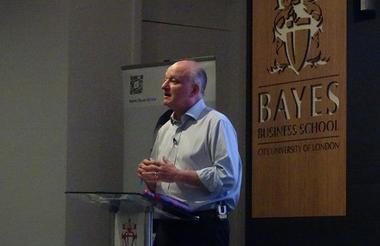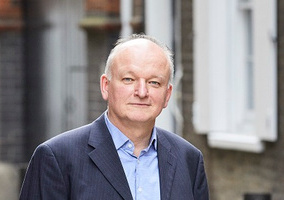Many large charities have become “mirror images of the state” by providing “substandard” services on behalf of the government instead of calling them to account, Paul Streets has said.
The outgoing chief executive of Lloyds Bank Foundation for England and Wales said large charities should be “calling the services to account, not providing the services, and we're not doing that”.
Streets told an audience of charity leaders yesterday that too many CEOs of large charities were “obsessed with the size of the organisation”, which prevented them from turning away contracts.
He praised charities such as Scope and Leonard Cheshire that had opted out of providing some services in recent years and said “we need to see more of that”.
‘Lost the plot’
Streets told the event at Bayes Business School that most smaller charities had remained connected to their communities and were just as “radical”, “active”, and “angry” as when they were founded.
“But I think big charities have lost the plot, often, they’ve become mirror images of the state,” he said.
He said that while some larger charities such as Cancer Research UK provided “exceptional” state-subsidised services, many had failed to criticise poor provision if they received a “public sector shilling”.
“We’ve been starved of cash for those services and what it's done is create, as I say, substandard services for people and substandard contracts,” he said.
“And my argument would be that actually, we should be calling the services to account, not providing the services, and we're not doing that.
“And that, frankly, means that probably some of the small charities should be calling to account some of the large charities that are big service providers that are providing substandard services, because that's the only way they can get a contract, because frankly their chief executive is obsessed with the size of the organisation and that's the only metric.
“That's not the metric you should use for success in the sector for most charities.”
Opting out
Streets praised charities that had handed back services in recent years and said more should follow suit.
“There are some charities that have already opted out. Leonard Cheshire opted out. Scope opted out,” he said.
“So, there’s a number of charities who’ve said ‘you have the contract back, we can’t provide for that kind of service’. And I think we need to see more of that actually.
“We cannot and should not provide services if a consequence of that is punitive terms and conditions for staff, which will just create another set of dependents, ultimately.
“So, I do think we have to withdraw from contracts.”
Challenged on his criticism of large charities by former British Red Cross CEO Mike Adamson, Streets said “the fundamental thing is we need to be independent”.
He said that if a charity is largely dependent on state funding, “that’s going to compromise your ability” to speak out.
“I have a fundamental problem with a charity that gets the bulk of its money from the state,” he said.
“And especially if it’s using its marginal voluntary sector income to cross subsidise it and then it’s providing a substandard service because the contract is so poor.”
Streets added that he did see a role for not-for-profit organisations and social businesses to receive most of their income from the state to provide services “but they’re not charities”.
According to NCVO’s latest UK Civil Society Almanac, local and central government funding for charities accounts for £16.8bn (30%) of the sector’s annual income.
Related Articles











